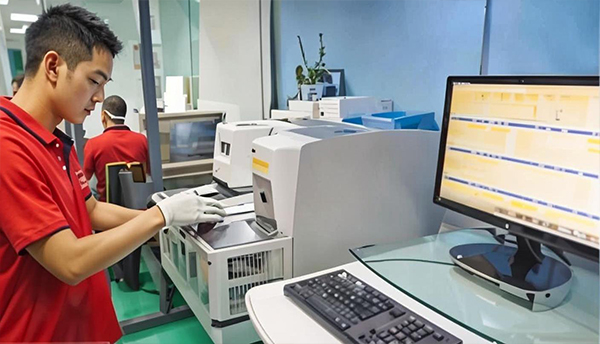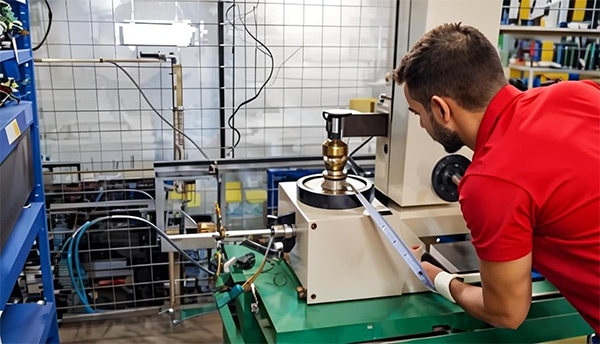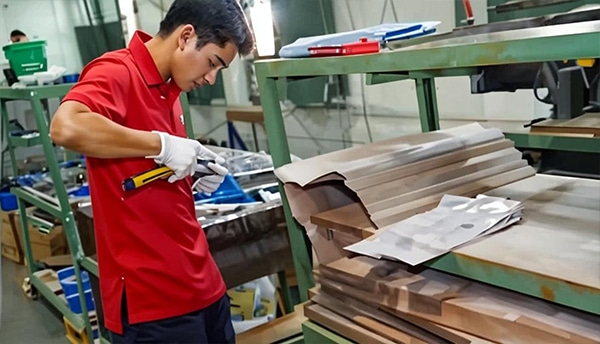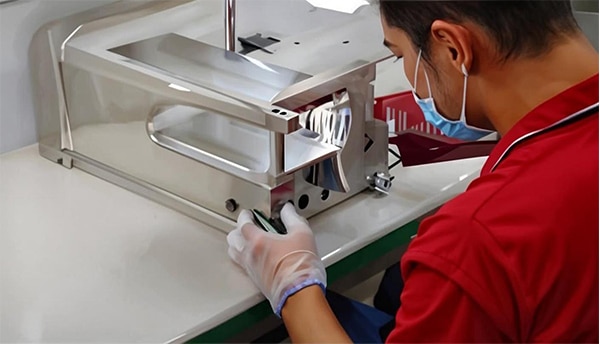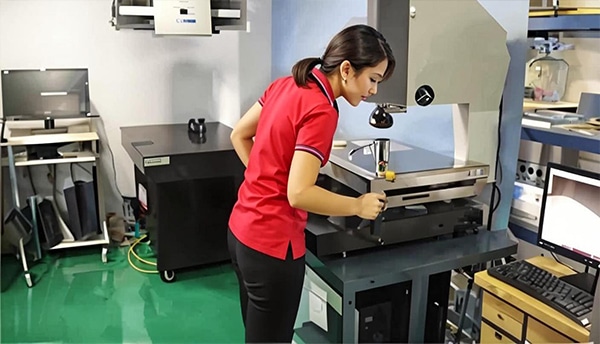1. CNC Custom Machining Process Discussion

Every custom CNC machining project begins with a detailed consultation. Our team works closely with you to understand the specific needs of your project, such as dimensions, tolerances, materials, and finishes. Our engineers then design the most efficient, cost-effective CNC machining process tailored to your unique requirements.
For complex or large-scale projects, we collaborate extensively, providing advice on product structure, material selection, and surface treatments. This ensures that the project is optimized from the very start for high efficiency and product quality. Our goal is to ensure your CNC custom machining needs are met, resulting in high-quality products with shorter lead times and fewer production challenges.
2. CNC Programming

Once the machining process is finalized, our experienced engineers use industry-leading software to create precise CNC programs. We utilize tools like MASTERCAM, UG, POWERMILL, CAD, PROE, and SOLIDWORKS to generate highly accurate machining instructions.
We focus on optimizing the process with dynamic milling technology, improving efficiency by up to 50%. This is crucial for complex and high-precision CNC custom machining tasks, ensuring maximum output and minimal processing time.
Additionally, we apply 8 patented quick clamping techniques, designed to speed up setups and reduce cycle time. This is particularly beneficial for complex, precise, or high-volume CNC custom machining projects, ensuring your parts are produced quickly and to exact specifications.
3. Raw Material Inspection

The quality of raw materials plays a pivotal role in ensuring the final product’s integrity. We carry out detailed raw material inspections using a spectrometer to verify the composition of every batch. This process eliminates the risk of using substandard materials that could affect the machining process or the finished product.
For materials like SUS304 and SUS316, which appear visually similar but have different mechanical properties, we ensure each batch undergoes rigorous testing. This helps confirm that the materials meet the precise requirements of your CNC custom machining project, ensuring the final product will meet the highest standards of durability and performance.
In CNC machining, particularly in CNC custom machining and parts CNC machining, precision and quality control are paramount. Below is a detailed breakdown of our quality control measures during the machining process to ensure the highest standards of accuracy and consistency.
1. Tool Inspection: Ensuring Precision and Efficiency

Before starting any CNC machining process, our operators perform a comprehensive inspection of all tools. This step ensures the tool’s flatness, concentricity, and overall condition. By identifying and correcting any imperfections or defects in the tools beforehand, we can prevent potential machining issues such as misalignment or tool wear. This additional step not only enhances machining efficiency but also reduces the likelihood of errors, ensuring that CNC custom machining jobs meet the required tolerances from the outset.
Regular tool inspections allow us to catch any issues before they affect the final product, providing greater reliability in the parts CNC machining process. It helps maintain high-quality standards, minimizes production delays, and improves overall workflow efficiency.
2. Operator Self-Inspection: Monitoring Quality at Every Step

After completing each machining cycle, operators perform a self-inspection on the machine. This process ensures that every step of the CNC machining procedure adheres to the exact specifications and quality standards. By conducting these self-checks after each program, operators can detect early signs of any discrepancies, whether in tool wear, dimensional accuracy, or program execution.
In CNC custom machining, even minor deviations can lead to significant quality issues. Thus, our operators’ self-inspection process plays a critical role in ensuring that each part is precisely manufactured and in full compliance with customer requirements. This method not only ensures high product quality but also helps reduce the chances of rework, enhancing production efficiency.
3. Random Inspection: Ensuring Consistency and Product Stability

Throughout the machining process, our quality control team conducts random inspections of semi-finished products. These random checks are performed at various stages of the production cycle, ensuring that the parts meet required standards for accuracy, finish, and overall quality. By inspecting products at different stages, we ensure consistent quality and avoid potential flaws that could develop later in the process.
For parts CNC machining, this step is crucial as it guarantees that every batch of parts meets the customer’s stringent requirements. It helps ensure product stability, consistency, and uniformity, which are essential for high-quality final products. This proactive inspection step helps maintain high standards and gives our customers confidence in the reliability of our machining services.
Conclusion
Our CNC machining process is designed with multiple layers of quality control, including thorough tool inspections, operator self-checks, and random process inspections. These steps work together to ensure that every component, whether for CNC custom machining or parts CNC machining, meets the highest standards of precision and quality. By integrating these comprehensive checks throughout the production process, we deliver reliable, high-quality products tailored to our clients’ exact specifications, ensuring they receive the best machining solutions every time.
For complex parts, particularly irregularly shaped and precision components, we employ automated equipment to efficiently remove burrs and sharp edges, ensuring that every part achieves a smooth, refined finish. This automated approach is particularly advantageous for CNC machining and CNC custom machining, where consistency and precision are crucial. For batch production, we minimize manual handling to maintain high efficiency and ensure uniform results, thus enhancing the overall quality and reliability of the parts during parts CNC machining.
Automated deburring eliminates inconsistencies that might arise from manual handling, improving the overall process by providing more uniform results and reducing production time. This step guarantees that every component is free of defects and meets the required surface finish standards.
1. Dimensional Inspection: Ensuring Precise Measurements

After the machining and deburring processes, our quality control team uses high-precision instruments such as Coordinate Measuring Machines (CMM), micrometers, and calipers to conduct thorough dimensional inspections of each part. This rigorous process ensures that every component meets the specifications outlined in the customer’s technical drawings.
In CNC machining, dimensional accuracy is crucial, particularly for complex or custom parts. Our precise inspection methods allow us to detect any discrepancies early, ensuring that only parts that meet the required tolerances move forward in the production process. Whether it’s CNC custom machining or parts CNC machining, accurate measurement and strict quality control are fundamental to producing high-quality components.
2. Custom Surface Finishing: Tailored to Customer Needs

Once the parts have passed dimensional inspection, we move on to the surface finishing stage, where we apply a variety of treatments to meet the functional and aesthetic requirements specified by the customer. These surface treatments include sandblasting, anodizing, electroplating, powder coating, painting, screen printing, and laser engraving.
Custom surface finishes not only enhance the visual appeal of the parts but also add functionality, such as improving corrosion resistance, wear resistance, and surface smoothness. Surface finishing is a key step in CNC custom machining, ensuring that each part not only meets technical specifications but also performs optimally in its intended environment.
3. Post-Surface Treatment Inspection: Verifying Dimensions After Finishing

Certain surface treatments, such as anodizing, electroplating, and powder coating, can affect the dimensions of the parts. To ensure that the parts still meet the required specifications after surface treatments, we perform a second round of dimensional inspections. This additional check guarantees that the final product retains the necessary accuracy and meets customer requirements despite any changes caused by surface treatments.
Post-treatment dimensional checks are an essential part of our quality assurance process in parts CNC machining, ensuring that the final products adhere to the specified tolerances, even after undergoing complex surface finishes.
4. Custom Packaging and Shipping: Ensuring Safe and Timely Delivery

After completing all machining, inspection, and surface treatment processes, we prepare the parts for delivery. Based on customer requirements, we provide customized, secure, and aesthetically pleasing packaging solutions. For high-end products, we offer branded packaging with the client’s logo, ensuring both protection and a professional presentation.
We work with trusted logistics partners to ensure that all products are delivered safely and on time. Our collaboration with reliable freight companies ensures that domestic shipments arrive within 12 hours, and cross-province deliveries are typically completed within 24 to 48 hours. Whether it’s for CNC machining or CNC custom machining, we prioritize fast, safe, and efficient delivery, ensuring customer satisfaction every step of the way.
Conclusion
From automated deburring and precise dimensional inspections to custom surface finishing and packaging, every step of our CNC machining process is designed to deliver high-quality, accurate parts. Whether you’re looking for CNC custom machining or parts CNC machining, our comprehensive post-processing procedures ensure that your components meet the highest standards of precision, performance, and aesthetics. With a focus on efficiency, consistency, and customer satisfaction, we are dedicated to providing reliable, tailored solutions for all your machining needs.
If you’re in the market for reliable CNC machining services, you’ve probably faced some common challenges—delays, quality inconsistencies, and subpar surface finishes. But what if there was a partner that could help you overcome these obstacles while ensuring precision and timely delivery? That’s where YL-Machining comes in.
1. On-Time Delivery You Can Count On

We all know how stressful it can be when projects are delayed, especially in CNC machining. Deadlines are tight, and late deliveries can cause a domino effect on your entire project. That’s why, at YL-Machining, we prioritize on-time delivery. With our streamlined processes and advanced scheduling systems, we ensure your parts are delivered on time, every time. We’ve built a reputation for reliability that our clients trust.
2. Precision and Quality Control

Quality control in CNC machining is not just a step in the process—it’s the foundation of what we do. From the moment we receive your order, we begin a rigorous inspection process. Our team uses state-of-the-art tools like Coordinate Measuring Machines (CMM) and micrometers to ensure every part is made to your exact specifications. We don’t just stop at machining—we also focus on surface finishes like anodizing, powder coating, and electroplating, making sure your parts look as good as they perform.
3. Custom Solutions for Your Needs
Whether you need a single prototype or a large-scale production run, we understand that every project is unique. At YL-Machining, we specialize in CNC custom machining, offering tailored solutions to meet your specific needs. We’re here to collaborate with you, adapting our approach to deliver the most efficient and cost-effective results, no matter the complexity of your parts.
4. Post-Production Support That Sets Us Apart
Unlike many suppliers who disappear once the parts are shipped, we believe in long-term partnerships. From custom packaging solutions to fast, reliable shipping, we go the extra mile to ensure your products arrive safely and on time. We’re here to support you at every stage, long after the machining process is complete.
Your Trusted CNC Machining Partner
When it comes to CNC machining, don’t settle for less. At YL-Machining, we combine precision, reliability, and exceptional customer service to help bring your projects to life. Whether you need CNC custom machining or a large production run, we’re here to ensure your parts are perfect every time. Ready to get started? Let’s make your next project a success.
As a professional in the CNC machining industry, I understand the challenges businesses face when choosing a partner for precision manufacturing. Whether you need rapid prototyping, high-volume production, or custom parts, it’s essential to find a reliable CNC machining provider that can meet your specific needs. So, what can YL-Machining do for you? Let me walk you through our capabilities and how we stand out in the industry.
1. Custom CNC Machining for Every Need
At YL-Machining, we specialize in CNC custom machining. Whether you’re working with intricate parts or large-scale production runs, we can tailor our services to your requirements. Our team is skilled at handling complex designs and delivering precision-crafted parts that meet your exact specifications. From prototype to final production, we ensure every detail is executed perfectly.
2. Quality Control You Can Trust
One of the biggest concerns with CNC machining is the inconsistency in quality. At YL-Machining, we’ve put in place stringent quality control measures to guarantee precision. We use cutting-edge equipment like Coordinate Measuring Machines (CMM) and micrometers to measure every part to the highest standards. This attention to detail ensures that your parts fit perfectly and function as intended.
3. Fast Turnaround Times Without Compromising Quality

Tight deadlines are common in the world of CNC machining, and I know that delays can disrupt your entire production schedule. That’s why we prioritize efficiency while maintaining our high standards of quality. We are committed to delivering your orders on time, every time. With our robust manufacturing processes, we streamline production without compromising on the excellence of our products.
4. Post-Production Support and Customization
At YL-Machining, our commitment to your project doesn’t end once the parts are produced. We offer comprehensive post-production services, including surface treatments such as anodizing, powder coating, and electroplating. Additionally, we can provide custom packaging solutions to ensure that your parts arrive safely and look great. Our team works closely with you to ensure that every aspect of your order meets your expectations.
5. Affordable Solutions for All Your CNC Machining Needs

When it comes to CNC machining, cost-effectiveness is a key concern for many clients. I can assure you that at YL-Machining, we offer competitive pricing without compromising quality. Our efficient processes and advanced technology allow us to provide high-quality parts at affordable prices, making us a smart choice for businesses of all sizes.
Your CNC Machining Partner
So, what can YL-Machining do for you? Quite simply, we offer custom CNC machining solutions, top-notch quality, quick turnaround times, and ongoing support. Whether you need custom parts for a single project or require long-term manufacturing support, we’re here to make your job easier. Let us handle the precision while you focus on growing your business. Ready to take the next step? Contact us today and let’s discuss how we can help you achieve your goals.
As a professional in the CNC machining industry, I understand how critical it is to find a reliable manufacturing partner. Whether you’re facing tight deadlines, quality control issues, or surface treatment challenges, the right CNC machining company can make all the difference. Let me share with you the key advantages that YL-Machining brings to the table.
1. Precision and Expertise in CNC Machining
At YL-Machining, precision is at the core of everything we do. I’ve been in the industry long enough to know that even a slight deviation can have significant consequences. With our advanced CNC machining technology, we ensure every component is manufactured to your exact specifications, whether it’s a small prototype or a large-scale production run. Our expert team carefully oversees every step of the process, delivering high-quality results you can trust.
2. Uncompromising Quality Control
When it comes to CNC machining, quality control is a non-negotiable factor. From my experience, many clients face frustration due to inconsistent product quality from their suppliers. At YL-Machining, we use stringent quality control procedures at each stage of production. Every part undergoes detailed inspections, ensuring it meets both industry standards and your specific requirements. This attention to detail reduces the likelihood of defects and returns, saving you time and money.
3. Fast Turnaround Times Without Compromising Quality
Speed is often a top concern in CNC machining—and I get it. You need your parts delivered on time, especially when facing tight deadlines. At YL-Machining, we pride ourselves on our efficient workflows that help speed up production without compromising on quality. Whether you need a quick turnaround for a prototype or a large batch of parts, our team is committed to delivering your order promptly and accurately.
4. Cost-Effective Solutions Tailored to Your Needs
I’ve seen it time and again: clients want quality, but they also want to stay within budget. That’s why at YL-Machining, we offer cost-effective solutions that don’t sacrifice quality. By optimizing our processes, maintaining efficient operations, and using the latest technology, we help you get the most value for your investment. This allows us to deliver high-performance CNC machined parts at competitive prices.
5. Comprehensive Services for a Seamless Experience
At YL-Machining, we believe in offering more than just CNC machining. We provide a full range of services to support your entire project—from design consultation to post-production support. Our capabilities include surface treatments, assembly, and packaging, making us a one-stop shop for all your machining needs. This comprehensive approach saves you time and effort, allowing you to focus on what truly matters: your core business operations.
Conclusion: Why Choose YL-Machining for CNC Machining?
Choosing the right CNC machining partner is crucial, and I’m confident that YL-Machining offers the perfect balance of precision, quality, speed, and affordability. With our commitment to delivering superior results, we make sure your CNC machining projects are in the best hands. Whether you need assistance with complex designs or efficient mass production, we are here to help you succeed. Contact us today to discuss how we can support your next project!






